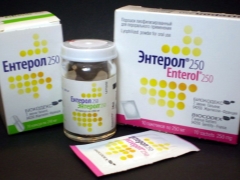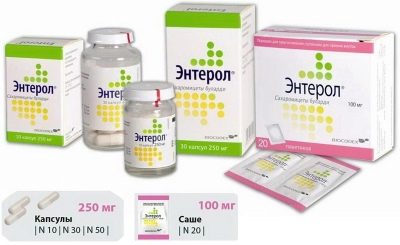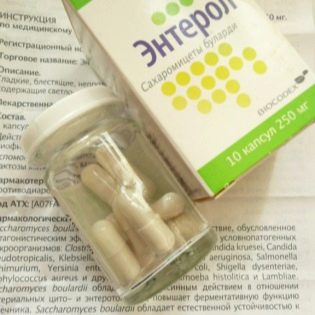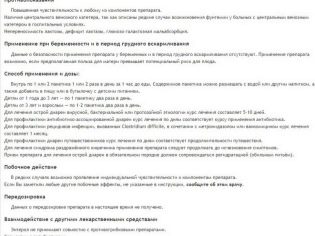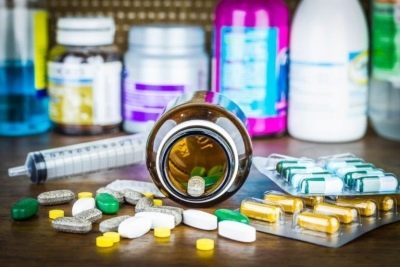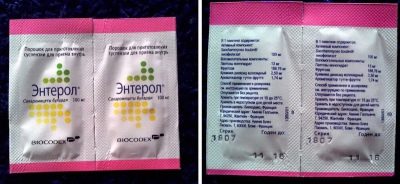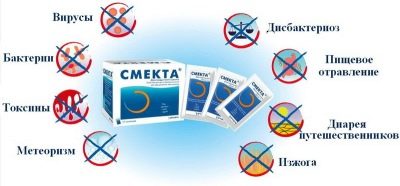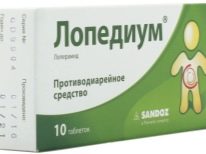Enterol for children: instructions for use
Young children often take different things in their mouths, and their digestive system is still immature, which is why many parents experience diarrhea, intestinal infections, poisoning, dysbacteriosis and similar problems. The drug called "Enterol" has properties to eliminate diarrhea and normalize the intestinal microflora. Since such a remedy has a minimum of contraindications, very rare side effects, quick action and affordable cost, it is quite popular in childhood.
Release form
"Enterol" is a product of the French company "Biocodex". There are two different forms of the drug:
- Powder in bags from which it is necessary to prepare suspension. Depending on the dosage inside a single sachet, there is 306 or 765 mg of light brown powder, which has a fruity odor. One pack contains from 10 to 50 bags.
- Capsules They are packaged in blisters of 5 or 6 capsules or sold in glass bottles. In one package is from 10 to 50 capsules. They have size 0 and an opaque white smooth casing, and inside is a light brown powder that has a peculiar smell of yeast.
Composition
The action of “Enterol” is provided by yeast fungi, which are called Boulardi sugar beetle (the Latin name is Saccharomyces boulardii). In the same bag, such microscopic mushrooms in lyophilized form are contained in a dosage of 100 mg or 250 mg, in a single capsule - in an amount of 250 mg.
Among the inactive components of the powder form of the drug are silicon dioxide, fructose, flavoring and milk sugar. Additional ingredients "Enterol" in the capsules are magnesium stearate and lactose (they are added to the saccharomycetes), as well as titanium dioxide and gelatin (from these two substances the capsule shell is made).
Operating principle
Enterol represents the group probioticstherefore, its reception has a healing effect on the body of people with various digestive disorders. The Bollardi saccharomycetes, which are part of both forms of the medicine, help get rid of many harmful bacteria in the digestive tract, including Salmonella, Yersinia, Staphylococcus aureus, Klebsiella, Clostridium and Escherichia. In Saccharomycetes, antagonism is noted with respect to such opportunistic and pathogenic microbes.
In addition, these fungi have an anti-toxic effect, which is the production of proteases - they break down toxic substances and affect the receptors of intestinal cells. Due to this effect, entero- and cytotoxins secreted by pathogenic bacteria in the gastrointestinal tract are neutralized.
The drug also has an antagonistic effect on candida, giardia and dysenteric amoebas. The drug affects some viruses (enteroviruses, rotaviruses) that can affect the digestive tract. In addition, the use of "Enterola":
- has a positive effect on the enzymatic function of the intestine, increasing the activity of lactase, maltase and other disaccharidases in the small intestine;
- It has an antisecretory effect, which reduces the release of sodium and water into the lumen of the intestine, which additionally helps in the fight against diarrhea;
- improves the condition of the walls of the small intestine, providing a trophic effect;
- enhances non-specific immunity by stimulating the production of immunoglobulin A.
Also note that Saccharomyces has natural resistance to antibacterial drugs. Unlike other probiotics, Enterol does not belong to the microflora of a healthy person. Once in the intestine, the single-celled fungi contained in the drug do not form colonies, but are excreted from the digestive tract unchanged.
If you stop taking it, then after 2-5 days there will be no sugar cells in the body.
Indications
Most often, "Enterol" is used as a symptomatic remedy for diarrhea or for its prevention. Both forms of medication are in demand:
- with diarrhea, caused by pathogenic bacteria, for example, salmonella or E. coli;
- with dysbacteriosis;
- in irritable bowel syndrome when diarrhea attacks are replaced by constipation;
- rotavirus infection and other diarrhea caused by viruses;
- with enterocolitis non-infectious nature;
- with candidal bowel disease;
- with diarrhea, which provoked drugs;
- with traveler's diarrhea;
- with pseudomembranous colitis caused by clostridia;
- at infection with lyambliya;
- with intestinal amebiasis;
- in case of poisoning.
At what age is children prescribed?
Both forms of Enterol can be used in patients older than 1 year, but capsules are usually not prescribed to children under the age of six, as it is difficult for kids to swallow them. If it is not possible to use the powder and a 1-6 year old child needs to be given a capsule, then the gelatinous shell is opened and the powder inside is dissolved in 50 ml of slightly warm or cool water, and then given to the baby to drink.
In some cases, the medication is prescribed for children under one year old, but only under the supervision of a physician and in reduced dosages.
Contraindications
The use of "Enterol" is prohibited in case of hypersensitivity to saccharomycetes or any inactive components of the drug. The drug also does not give hospitalized patients with a central venous catheter, because it increases the risk of fungal infection.
Since the composition of both forms of the drug includes lactose, "Enterol" should not be used in young patients with lactase deficiency or intolerance to milk sugar. Due to the presence of fructose in the powder, this form of the drug is not indicated for children with rare hereditary pathologies in which carbohydrate absorption is impaired.
Side effects
A child’s body may react to Enterol by an allergic reaction, such as skin itching, redness, or urticaria. Such manifestations of intolerance are very rare, but their occurrence requires the immediate discontinuation of the drug. Also, some children during treatment with Enterol can experience constipation, headaches, increased gas formation.
With such negative symptoms, you should consult with your doctor.
Instructions for use
The medication is taken one hour before meals. To give the child powder, you must first open the bag, and then mix its contents in any drink. “Enterol” in capsules is preferable to swallow and drink a cool or slightly warm drink.
To dilute the powder, ordinary water is best suited, but you can use juice, compote, milk or other liquid. However, it should not be hot, because "Enterol" includes living cultures. For this reason, it is also impossible to heat the powder with water. If you use a drink from the refrigerator, it should be heated separately (but not more than room temperature) and only then mix the powder in the liquid.
If the child accidentally misses one or more doses of the drug, no additional action is required. The use of Enterol is continued according to the regimen prescribed by the doctor.
Dosage
The drug is usually given twice a day, and a single dosage is determined by the child's age:
- Baby 1-3 years 1 to 3 sachets are required per dose, depending on the amount of sugar cubicles in one sachet. If it became necessary to give the patient of this age “Enterol” in capsules, then the contents of one capsule will be a single dosage.
- A child over the age of three Give the contents of two or four bags at once. "Enterol" in solid form is prescribed to such patients one or two capsules per reception.
How long to give?
The duration of use of "Enterol" is influenced by many factors. First of all, the doctor takes into account the clinical manifestations and the cause of diarrhea, for example:
- if diarrhea is triggered by a bacterial or viral infection, the medication is prescribed for a course of 5 to 10 days;
- if the reason for the use of "Enterol" is the prevention of diarrhea due to antibiotic treatment, the medication should be taken as much as the small patient receives antibacterial agents;
- with dysbiosis, the medication is usually prescribed for 10-14 days;
- in order to prevent diarrhea during travel, the drug is given throughout the trip;
- if Enterol is used for functional disorders, treatment is stopped as soon as the symptoms disappear.
If the medication is taken in acute diarrhea for 2 days and no improvement is noticeable, you should consult a doctor. In addition, contact a specialist in the treatment of "Enterol" should be in such situations:
- if a lot of mucus appears in the baby’s feces;
- if blood is found in the stools;
- if the patient has a fever;
- if the child refuses to drink.
Overdose
There have been no situations when the administration of a large dose of "Enterol" had a negative effect on the human body. If you exceed the dosage, it is recommended to monitor the condition of the child and, if it has worsened, contact a doctor.
Interaction with other drugs
The drug is well combined with solutions for rehydration and is often prescribed with them to prevent dehydration. However, it is not recommended to give along with any antifungal agents. However, Enterol is compatible with antibiotics, since they do not affect saccharomyces. In dysbiosis, the drug can be administered together with drugs that contain lactic or bifidobacteria.
Terms of sale
For the purchase of both forms of "Enterol" recipe is not needed, but the doctor's advice is desirable.
The average price of 10 sachets of 250 mg is 280 rubles, and for 20 sachets with the same dosage, you need to pay about 500 rubles. The cost of a package of 10 capsules is 240-280 rubles, and a jar with 30 capsules costs 460-550 rubles.
Storage conditions
Keep the medicine at home should be in a dry place so that the drug does not reach the small children. The recommended temperature range for proper storage of capsules and sealed sachets is from +15 to +25 degrees. The shelf life of both forms of Enterol is 3 years. It is listed on the box, blisters and tea bags, so before the start of treatment, the date of production should be clarified, and only after that should the children be given medication.
Reviews
More than 90% of reviews on the use of "Enterol" call such a probiotic effective, safe and effective. According to parents, the drug is easy to give the child, it has a positive effect on the condition of the digestive system and helps stop diarrhea in a short time. Judging by the majority of reviews, such medicine is generally well tolerated, and allergy to Enterol is extremely rare.
The advantages of the drug also include the possibility of use in children older than a year and a pleasant taste. The cost of the drug, according to moms, is acceptable, but some parents call it overpriced and are looking for a replacement cheaper.
Analogs
Medicines based on the same active substances are not released, therefore if necessary, replace “Enterol” with another drug, the doctor usually prescribes another probiotic or a remedy for diarrhea, for example:
- «Smecta». This medicine is also produced in France in the form of a powder or a finished suspension. It is called safe for children, so it is prescribed at any age. Due to the smectite contained in it, the drug is able to absorb bacteria, toxins and viruses, and also envelops the intestinal walls and stimulates the protective function of the intestines. "Smecta" is in demand for vomiting, bloating, diarrhea, abdominal pain and other negative symptoms caused by overeating, poisoning, intestinal infection, food allergies and other factors.
- «Imodium». This drug helps with diarrhea due to loperamide, which inhibits intestinal motility and prevents the rapid evacuation of fecal masses. The medicine is represented by pills that are given to children over 6 years old (they need to be absorbed) and can be replaced with products with the same ingredient - Lopedium, Diane and others.
- "Bifiform". Such a probiotic includes bifidobacteria and is produced in solution, powder, tablets and other forms. It works effectively with rotavirus, dysbacteriosis and many other diseases of the digestive tract. For infants such medication is administered in solution, and from one year the powder is discharged. “Bifiform” in capsules is used from 2 years of age, and in tablets from 3 years.
"Enterofuril" - is it better or not?
Both of these drugs are in demand for diarrhea, but they contain different ingredients. If Enterol acts through live fungi that counteract harmful bacteria, thenEnterofuril"Is an antibacterial agent. Its main component is called nifuroxazide and can affect clostridia, Escherichia coli, Klebsiella, staphylococcus and many other bacteria.
And so the main reason for prescribing Enterofuril is bacterial diarrhea, while the scope of Enterol is more extensive.
"Enterofuril" is also represented by two forms, one of which are capsules, prescribed to children over 3 years old. The second form of the drug, in contrast to Enterol, is not a sachet with powder, but a ready-to-use suspension with a banana flavor. This pediatric version of the drug can be used even in infants, since it is allowed from 1 month.
The method of dosing "Enterol" is called more convenient, since it is necessary to give children diluted powder or capsules only twice a day. The "Enterofuril" regimen is intended to be taken 3-4 times a day with an equal time interval, for example, every 8 hours. Both drugs are sold without a prescription, but you can store the opened liquid Enterofuril for no longer than 14 days, while Enterol can be stored at home in a first-aid kit for up to 3 years from the date of issue.
Video instruction on the use of "Enterol", see the following video.
